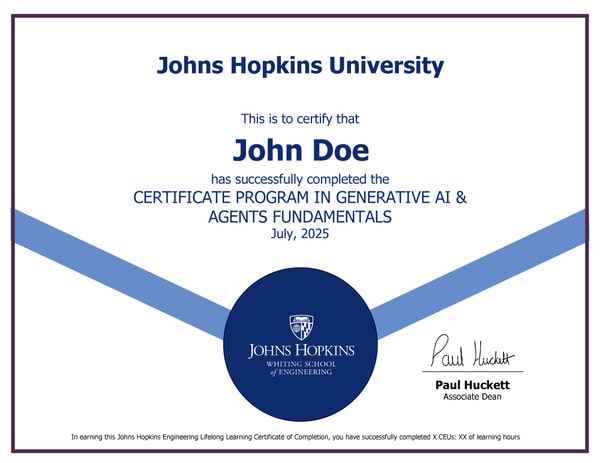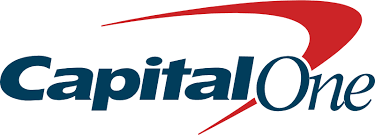Learn more about the course
Get details on syllabus, projects, tools, and more

Certificate Program in Generative AI & Agents Fundamentals
Learn from World-Renowned JHU Faculty

PROGRAM OUTCOMES
Become an AI-powered professional
Drive business value through the strategic implementation of AI technologies
-
Understand key concepts in NLP, Generative AI, and Large Language Models (LLMs)
-
Explore strategic business applications and real-world use cases of Generative AI.
-
Learn Responsible AI principles and recognize risks, ethics, and compliance.
-
Understand AI agents’ evolution, autonomy, memory, reasoning, and tool use.
Earn a Certificate of Completion from Johns Hopkins University
KEY PROGRAM HIGHLIGHTS
Why choose this program
-

Learn from a top-ranked university
Learn from expert JHU faculty and industry leaders.
-

Hands-on learning
Drive business value by strategically using AI technologies through hands-on work and case studies.
-

Industry-focused curriculum
The curriculum covers key areas such as Large Language Models, Prompt Engineering, Agentic AI, and Responsible AI.
-

Live masterclasses and mentorship
Experience live mentorship by industry experts and live faculty-led masterclasses for structured, personalized learning.
-

Learning support
Get unique academic support through the Great Learning community, project discussion forums, and peer groups for a comprehensive learning experience.
-

Dedicated support
Access a dedicated Program Manager who will assist you through your learning journey to ensure you achieve your learning objectives.
Skills you will learn
ChatGPT
NotebookLM
OpenAI LLMs
Natural Language Processing
Generative AI
Prompt Engineering
Retrieval-Augmented Generation (RAG)
AI Agents & Workflows
LLM Workflows
ChatGPT
NotebookLM
OpenAI LLMs
Natural Language Processing
Generative AI
Prompt Engineering
Retrieval-Augmented Generation (RAG)
AI Agents & Workflows
LLM Workflows
view more
- Overview
- Curriculum
- Projects
- Tools
- Certificate
- Faculty
- Mentors
- Fees
- FAQ

This program is ideal for
Individuals seeking a fundamental understanding of Generative AI and its practical applications
-
Knowledge professionals
In sales, marketing, operations, finance, legal, product, and related functions.
-
Technology enthusiasts
Seeking to use Generative AI to boost productivity and drive business value.
-
AI-curious professionals:
Interested in understanding and using AI at work.
-
Value-driven professionals
Looking to drive business value through the strategic implementation of AI technologies.
Curriculum
The curriculum for this Certificate Program in Generative AI & Agents Fundamentals is designed by the faculty of Johns Hopkins University and leading industry practitioners. It requires no prior programming experience and is taught by best-in-class professors, practicing industry experts, and professionals from leading global companies.
-
Live Masterclasses
By JHU Faculty
-
Live Mentorship
By industry experts
-
Self-Paced
Modules
Week 1: Foundations of Generative AI and NLP
- Introduces core concepts of Generative AI and Natural Language Processing (NLP)
- Defines Generative AI and distinguishes it from traditional AI
- Explores the historical evolution and strategic importance of Generative AI in various industries
- Covers fundamental NLP concepts and their historical development
- Provides a foundation for understanding how language models function and their application
Week 2: Prompt Engineering Fundamentals
- Focuses on essential skills of Prompt Engineering
- Teaches how to craft effective prompts
- Covers creating contextual prompts for various situations
- Introduces best practice prompting techniques
- Enables effective interactions with Generative AI models and maximizes their utility in various scenarios.
Week 3: Advanced Prompt Engineering for Business Intelligence
- Delves into advanced prompting techniques for complex business scenarios
- Explores Generative AI-powered applications for business intelligence across diverse sectors
- Covers techniques to enhance LLM performance
- Introduces Retrieval-Augmented Generation (RAG) for improved output accuracy and relevance
Week 4: Gen AI Assistants for Business Use-Cases
- Provides strategies for managing Generative AI changes within organizations
- Covers common pitfalls and implementation steps
- Evaluates implementation costs and user impact
- Explores real-world use cases in healthcare, HR, and marketing
Week 5: Introduction to AI Agents
- Introduces the concept and evolution of AI agents
- Explains how agents differ from traditional models using real-world analogies
- Covers key concepts: environment, autonomy, memory, reasoning, and tool use
- Identifies classical agent types and modern patterns like REACT and Reflection
- Explores business applications of AI agents
Week 6: Business Applications of AI Agents
- Focuses on the practical applications of AI agents
- Differentiates between agentic workflows and autonomous agents
- Applies REACT and Reflection for task-specific agent design
- Covers designing agentic workflows and AI agents by defining roles, prompts, memory, and tool access.
- Emphasizes selecting tools effectively and implementing memory strategies for reliable, personalized, and intelligent agent behavior.
- Explains monitoring through observability, evaluation, and feedback loops
- Focuses on avoiding common design and deployment pitfalls
Week 7: Responsible AI Practices
- Addresses key Responsible AI concepts, including risks and ethics
- Identifies major LLM security risks (jailbreaking, prompt injection, data poisoning, insecure outputs)
- Explains how supply chain vulnerabilities and service denial affect LLM reliability and accountability.
- Teaches the application of the CIA Triad (Confidentiality, Integrity, Availability) to assess and mitigate security risks in LLM deployments.
- Analyzes real-world LLM failures across various sectors, focusing on competence versus hallucination.
- Explains why LLMs struggle with reasoning and strategies like Chain-of-Thought and Retrieval-Augmented Generation to improve reasoning.
- Promotes safe and accountable LLM usage by verifying outputs, applying ethical practices, and ensuring transparency
Week 8: Project and Assessment
- Final assessment to test understanding of core concepts
- Includes a reflective essay to apply strategic thinking to real-world problems using Generative AI and Agents
Self-Paced Modules
Modules designed to help you learn at your own pace, while building strong foundational expertise.
- Build a simple LLM workflow
- Large Language Model Architecture and Mechanics
Work on hands-on projects and case studies
Engage in projects and real-world case studies using emerging tools and technologies across sectors
-
Gen AI
Use Cases
-
Industry-Relevant
Projects
Earn a certificate of completion from Johns Hopkins University
Get a globally recognized credential from a top U.S. university and showcase it to your network

* Image for illustration only. Certificate subject to change.
Meet your faculty
Learn from world-renowned faculty with in-depth expertise in AI, neuroscience, and applied analytics
Interact with our industry mentors
Interact with dedicated mentors who are current practitioners and experts in Agentic AI
Program fee
The program fee is USD 1,800
Invest in your career
-

Understand NLP, differentiate Generative AI vs. traditional AI, explore LLMs, and grasp fundamentals of Prompt Engineering.
-

Identify strategic business uses and industry cases for Generative AI.
-

Learn Responsible AI principles and recognize risks, ethics, and compliance.
-

Understand AI agents’ evolution, autonomy, memory, reasoning, and tool use.
Batch start date
-
Online · 28th Mar 2026
Admission closing soon
Frequently asked questions
What is the Certificate Program in Generative AI & Agents Fundamentals?
The Certificate Program in Generative AI & Agents Fundamentals is an 8-week online program from Johns Hopkins University. It is designed for professionals across business functions and technical leaders who want a comprehensive, reliable foundation in Generative AI and AI agents.
The program assumes no technical background and offers a clear, structured learning path to build a solid foundation in Generative AI, its practical applications, Prompt Engineering, and the fundamentals of AI agents. Learners engage with real business scenarios through projects and case studies, join weekly live sessions with global industry experts, and attend masterclasses led by Johns Hopkins University faculty. The curriculum blends core concepts, hands-on activities, and a final assessment to help professionals apply their learning across roles and industries.
What will I learn in this program?
In this program, you will learn:
- Key concepts in NLP, Generative AI, and Large Language Models (LLMs)
- Fundamentals of Prompt Engineering in the context of business scenarios
- Strategic business opportunities and industry use cases of Generative AI across sectors
- Principles of Responsible AI (fairness, transparency, accountability)
- Risks, ethical considerations, and compliance challenges of Generative AI
- Evolution and key concepts of AI agents, including autonomy, memory, reasoning, and tool use, with real-world examples
What are the key features of this course on Generative AI & Agents Fundamentals?
The Certificate Program in Generative AI & Agents Fundamentals by Johns Hopkins University offers the following key features:
- Eight-week online learning format
- Recorded video lectures, live expert mentorship sessions, and faculty-led masterclasses
- Hands-on practice with real business projects and case studies
- Personalized support from a dedicated Program Manager
- Academic support through the GL community, project discussion, forums, and peer groups
- AI-assisted learning tools to strengthen understanding
- Industry-aligned curriculum focused on Generative AI, Prompt Engineering, AI agents, and Responsible AI
- Weekly graded quizzes and a final assessment
- A Certificate of Completion with 6.5 Continuing Education Units from Johns Hopkins University
How is the Certificate Program in Generative AI & Agents Fundamentals delivered?
The Certificate Program in Generative AI & Agents Fundamentals is delivered online through a structured eight-week format that includes:
- Self-paced video modules
- Weekly live sessions with global industry experts
- Faculty-led masterclasses from Johns Hopkins University
- Hands-on activities and real-world case studies
- Weekly graded quizzes
- A final assessment and reflection
- Personalized assistance from a dedicated Program Manager, and academic support through the GL community, project discussion forums, and peer groups.
Will I get any learning support in JHU’s Generative AI & Agents Fundamentals Course?
Yes, learners receive dedicated support throughout the program. A Program Manager guides learners through the eight-week journey, offering help with scheduling, progress, and access to resources.
Learners also engage with the GL community, project discussion forums, and peer groups for academic support. Live mentorship sessions and faculty-led masterclasses are designed to offer added clarity and help reinforce key concepts.
What is the duration of this Certificate Program in Generative AI & Agents Fundamentals?
The program runs for eight weeks. Learners spend 8 to 10 hours per week on self-paced modules, live expert sessions, masterclasses, and hands-on activities.
What is the weekly commitment for this program?
Learners are expected to dedicate 8-10 hours per week to complete the Generative AI and AI Agents courses, participate in live sessions, and work on hands-on assignments and case studies.
Who are the faculty and mentors for this program?
The program is led by world-class faculty from Johns Hopkins University with deep expertise in Artificial Intelligence, neuroscience, and applied analytics. The core faculty includes
Dr. Christophe Morin, Co-Founder and Chief Persuasion Scientist, SalesBrain
Dr. Jane Pinelis, Chief AI Engineer, Applied Information Sciences Branch, Johns Hopkins University Applied Physics Laboratory
Dr. Ian McCulloh, Manager of Artificial Intelligence Continuing and Executive Education, Johns Hopkins University
Learners also receive guidance from industry mentors with experience in leading technology and AI-driven organizations. The mentor group includes
- Bridget Huang, Tech Lead, Engineering, Capital One
- Tanya Glozman, Applied Science – AI/ML, Apple
- Michael Lively, Founder, QuantumAI
Note: This is an indicative list and may change based on faculty and mentor availability.
How do I earn the certificate? What is the value of this Certificate in Generative AI & Agents Fundamentals?
Upon successful completion of the program, learners will receive a Certificate of Completion from Johns Hopkins University. This certificate demonstrates proficiency in Generative AI, AI agents, and their practical applications in business.
In addition to the certificate, learners will earn 6.5 Continuing Education Units (CEUs), which contribute to ongoing professional development. This credential adds value to your resume, showcasing your expertise in Generative AI and AI Agent Fundamentals, enhancing career prospects, and positioning you as a leader in AI innovation.
What sets this certificate program apart from other Generative AI programs?
This program is distinguished by several key features:
- Developed by Johns Hopkins University, one of the top-ranked universities with a global reputation in research and education.
- Curriculum curated and delivered by world-renowned JHU faculty with expertise in AI, Machine Learning, and Applied Analytics.
- Live masterclasses by JHU faculty, along with live mentored sessions from global industry experts.
- Hands-on practice through real-world case studies and projects, ensuring practical application of concepts.
- A Certificate of Completion from Johns Hopkins University and 6.5 CEUs upon program completion.
- Personalized support from a dedicated Program Manager throughout the learning journey.
What tools and technologies will I use in the program?
The program includes tools such as Large Language Models (LLMs), Generative AI assistants, and AI agents. Learners will apply these tools through hands-on activities, case studies, and the final project.
How can I contact the program team for more information?
For any queries or assistance, you can reach out to us at office-gaaf-gl@jhu.edu or call us at +1 410 650 6319.
Who is this program for?
The program requires no programming knowledge and will be especially relevant to:
- Knowledge professionals in sales, marketing, operations, finance, legal, product, and related functions
- Anyone new to Generative AI who wants to boost productivity and drive business value
- Professionals interested in understanding AI and applying it at work
What is the enrollment process for the program?
1. Enter Your Details
Provide your information to begin the enrollment process
2. Accept Terms
Review and agree to the terms and conditions to proceed with enrollment
3. Make Payment
Complete the payment to receive your enrollment confirmation via email
Please note: The enrollment process is conducted on a rolling basis and will be closed once the requisite number of candidates are enrolled.
What is the program fee?
The total program fee for the Certificate Program in Generative AI & Agents Fundamentals is $1,800. Flexible payment options are available, and you can contact the Program Advisor for more details on payment plans and potential financial assistance.
Is financial assistance available?
Yes, financial assistance is available through various partners, offering options to pay the program fee in installments. For more information on payment plans and eligibility, please contact our program advisors.
What are CEUs, and how are they useful?
Upon successful completion of the program, you will earn 6.5 Continuing Education Units (CEUs) along with a certificate of completion from Johns Hopkins University. CEUs are a measure of instructional time and reflect the estimated time an average student will spend completing the mandatory components of a course. CEUs are awarded upon successful completion of all course requirements, which may include assessments, assignments, evaluations, or a final project. Earning CEUs enables professionals to demonstrate their commitment to ongoing learning and professional development.
How do Generative AI and AI Agents help businesses?
Generative AI and AI Agents help businesses enhance productivity, automate tasks, and drive innovation. They enable businesses to make data-driven decisions, improve customer experiences, and optimize operations across various functions.
Delivered in Collaboration with:
Johns Hopkins University is collaborating with online education provider Great Learning to offer the Certificate Program in Generative AI & Agents Fundamentals. Great Learning is a professional learning company with a global footprint in 14+ countries. Its mission is to make professionals around the globe proficient and future-ready. This program leverages JHU's leadership in innovation, science, engineering, and technical disciplines developed over years of research, teaching, and practice. Great Learning manages the enrollments and provides industry experts, student counselors, course support and guidance to ensure students get hands-on training and live personalized mentorship on the application of concepts taught by the JHU faculty.



 Speak with our expert
Speak with our expert





















